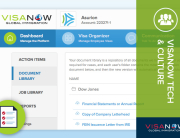As we predicted yesterday, late last evening and just hours before a possible default, President Obama signed a bill that reopened the U.S. government and re-installed thousands of government employees to their posts. Today he made an official statement that immigration reform will be a top priority for the rest of 2013.
What does the end of the shutdown mean for U.S. immigration services?
All U.S. immigration services that were affected by the shutdown should be reinstated very soon, if they haven’t already. As of this morning, E-Verify and I-9 services were back up and running, and the Department of Labor is open again. However, the Office of Foreign Labor Certifications (OFLC) which is responsible for services needed to process work-based green cards and visas like the H-1B, is still not functional as of 5pm CST today. Most likely, the PERM and iCERT portals will be fully restored tomorrow (October 18) so that work-based visa applications can once again continue to be processed.
Family and travel visas were not affected by the shutdown, so these services should proceed as usual. USCIS services were not interrupted owing to the fact that their services are fee-funded and are not directly reliant on the government.
Obama addresses immigration reform in his first speech since reopening the government
This morning, Obama gave his first public announcement since the government reopened, and he wasted no time in naming the three main issues he wants Congress to tackle before the end of 2013: budget issues, the farm bill, and fixing the broken immigration system.
“There’s already a broad coalition across America that’s behind this effort of comprehensive immigration reform “” from business leaders to faith leaders to law enforcement,” the President emphasized this morning. He reiterated the fact that a bill already exists with strong bipartisan support that has already passed through the Senate and is waiting to be addressed in the House of Representatives, making it an easy win for U.S. government. He continued, “Now, if the House has ideas on how to improve the Senate bill, let’s hear them. Let’s start the negotiations. But let’s not leave this problem to keep festering for another year, or two years, or three years. This can and should get done by the end of this year.”
Obama was also quick to address the economic benefits of immigration reform in light of the all the recent issues with the U.S. economy, jobs, and the budget. “These last few weeks have inflicted completely unnecessary damage on our economy. We don’t know yet the full scope of the damage, but every analyst out there believes it slowed our growth.” Obama used immigration reform as a contrast to current U.S. financial struggles: “Economists estimate that if that bill becomes law, our economy would be 5 percent larger two decades from now. That’s $1.4 trillion in new economic growth.”
The future of 2013 immigration reform
The government has been open for less than a day, so it’s hard to predict what will happen and if Obama’s statements will be carried out with conviction and support from Congress. Republicans have been mostly silent so far on the issue, but many are hoping that Speaker Boehner will consider bringing the comprehensive immigration reform bill to the House floor just as he brought last night’s budget bill to the floor without a clear majority of support from his Republican colleagues.







